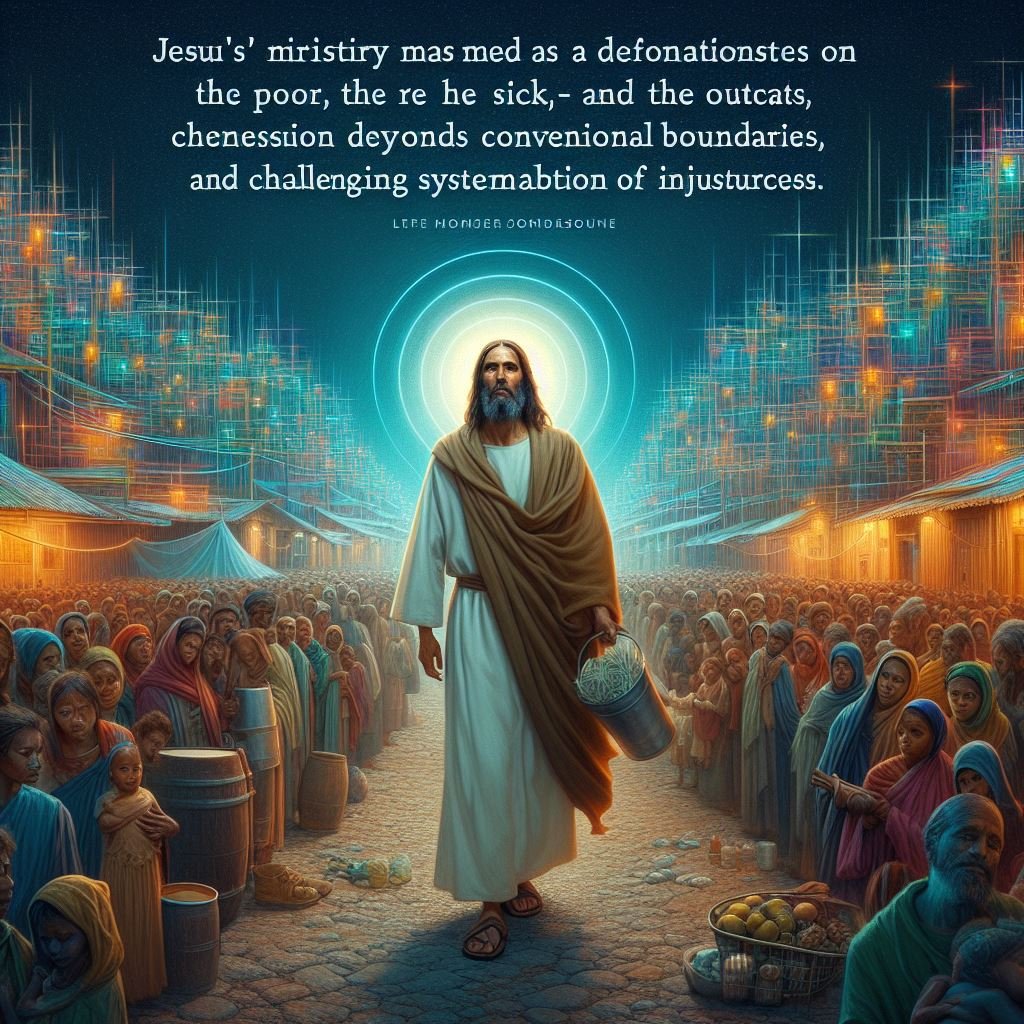Blessed Are the Poor: Jesus’ Radical Teachings on Wealth and Poverty, Challenging Economic Systems
Introduction:

In the annals of history, few voices resonate as powerfully as that of Jesus of Nazareth. His teachings, rooted in compassion and justice, challenged societal norms and continue to echo through the ages. Among the profound themes addressed by Jesus is the matter of wealth and poverty. His radical perspectives on economic justice not only challenged the prevailing systems of his time but also offer timeless insights for contemporary societies grappling with issues of inequality and social justice.
- The Dangers of Wealth:

Jesus’ teachings consistently emphasized the potential pitfalls of wealth. His warning, “It is easier for a camel to go through the eye of a needle than for a rich person to enter the kingdom of God” (Matthew 19:24), underscores the spiritual dangers of unchecked accumulation of wealth. This challenges individuals to reevaluate their relationship with material possessions, prompting introspection about the ethical implications of affluence.
- The Beatitudes:

In the Sermon on the Mount, Jesus pronounced blessings on the poor in spirit, those who mourn, and the meek (Matthew 5:3-5). These Beatitudes present a counter-cultural perspective, suggesting that God’s favor rests not on the powerful and wealthy, but on the humble and compassionate. This transformative message challenges societal norms, encouraging believers to prioritize virtues over material success.
- The Parable of the Rich Fool:

In the Parable of the Rich Fool (Luke 12:13-21), Jesus tells of a wealthy man who, focused on amassing wealth for himself, neglects the deeper purpose of life. The parable serves as a cautionary tale against the pursuit of wealth at the expense of spiritual and communal well-being. It prompts reflection on the ethical responsibilities that come with economic privilege.
- The Widow’s Offering:

In a poignant moment at the temple, Jesus contrasts the ostentatious offerings of the wealthy with the sacrificial gift of a poor widow. He commends her, declaring that she has given more than all the others because she gave out of her poverty (Mark 12:41-44). This narrative challenges prevailing notions of generosity, highlighting the inherent value of self-sacrifice and the significance of one’s heart in matters of giving.
- The Call to Generosity:

Jesus consistently emphasized the call to generosity and compassion, urging followers to care for the less fortunate. His parables often underscored the importance of using wealth for the benefit of others, promoting a mindset of stewardship rather than hoarding (Luke 12:33-34). This challenges individuals to reevaluate their approach to wealth, viewing it as a tool for positive impact rather than personal accumulation.
- Concern for the Marginalized:

Jesus’ ministry was marked by a deliberate focus on those marginalized by society – the poor, the sick, and the outcasts. His compassion extended beyond conventional boundaries, challenging systemic injustices. This advocacy for the marginalized serves as a call for contemporary societies to address economic disparities and work towards a more inclusive and just distribution of resources.
Conclusion:
Jesus’ teachings on wealth and poverty cut to the core of societal structures, challenging individuals to reevaluate their priorities and economic systems. In a world grappling with issues of income inequality and social justice, the radical perspectives of Jesus offer a timeless call to prioritize compassion, generosity, and justice. As individuals and societies navigate the complexities of wealth, Jesus’ teachings continue to challenge, inspire, and beckon towards a vision of economic systems rooted in love, equity, and the well-being of all.
Related Posts
-
 GOD’S LOVE: A SIMPLE TRUTH IN JOHN 3:16
No Comments | Jan 17, 2024
GOD’S LOVE: A SIMPLE TRUTH IN JOHN 3:16
No Comments | Jan 17, 2024 -
 Jesus in Comparative Religions: Bridging Commonalities, Acknowledging Differences
No Comments | Feb 5, 2024
Jesus in Comparative Religions: Bridging Commonalities, Acknowledging Differences
No Comments | Feb 5, 2024 -
 The Miracle of Bethlehem: Unveiling the Profound Significance of Jesus’ Birth
No Comments | Feb 2, 2024
The Miracle of Bethlehem: Unveiling the Profound Significance of Jesus’ Birth
No Comments | Feb 2, 2024 -
 Healing Touch: Jesus as the Ultimate Healer
No Comments | Jan 24, 2024
Healing Touch: Jesus as the Ultimate Healer
No Comments | Jan 24, 2024
